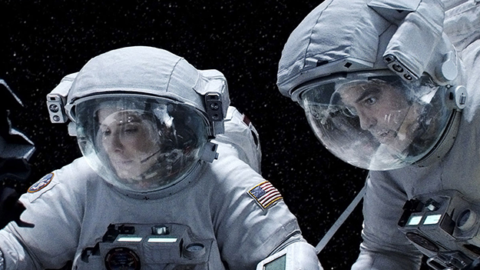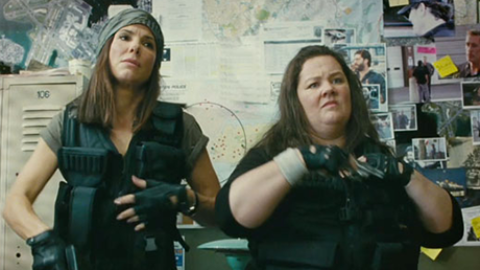Deep Focus: Our Brand Is Crisis
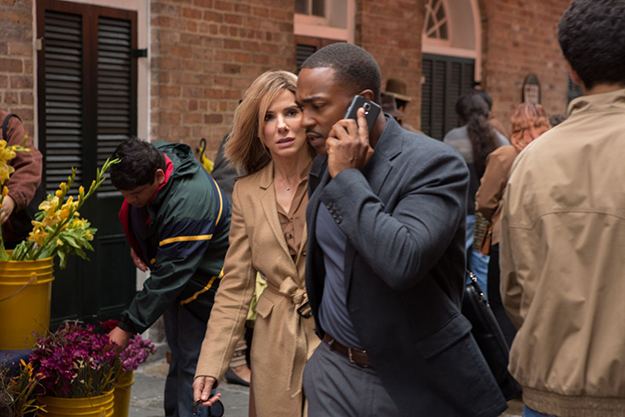
David Gordon Green’s Our Brand Is Crisis satirizes, sloppily, the risk of adapting American politics to other nations and exporting American democracy as a “one kind fits all” form of government, even to underdeveloped countries. The film is based on the Bolivian presidential election of 2002, which exposed the rifts in a republic still struggling to meet its indigenous peoples’ needs after nearly two centuries of independence.
Fictionalizing Rachel Boynton’s jaw-dropping 2005 documentary of the same name, Green and screenwriter Peter Straughan (Tinker Tailor Soldier Spy) strive to catch audiences up in the adrenaline-pumping competition between American political consultants “Calamity Jane” Bodine (Sandra Bullock) and Pat Candy (Billy Bob Thornton). As they powwow in La Paz for rival candidates, the film means to convey the absurd thrills and chilling consequences of playing politics as blood sport.
Calamity Jane is supposed to be a mercurial, instinctive genius at messaging and spin. She’s the ideal woman to batter sense into the head of a blunt, arrogant candidate—the former president Castillo (Joaquim de Almeida), who failed to deliver on his campaign promises 15 years ago. Castillo’s beliefs in the free market and international trade have raised the hackles of Bolivians who detest foreign investors for exploiting their natural resources and leaving them in poverty. Candy is supposed to function as the grinning Satanic antagonist who has defeated Jane several times before and catalyzes her to up her game. His candidate, Rivera (Louis Arcella), is a self-styled populist with a great head of hair.
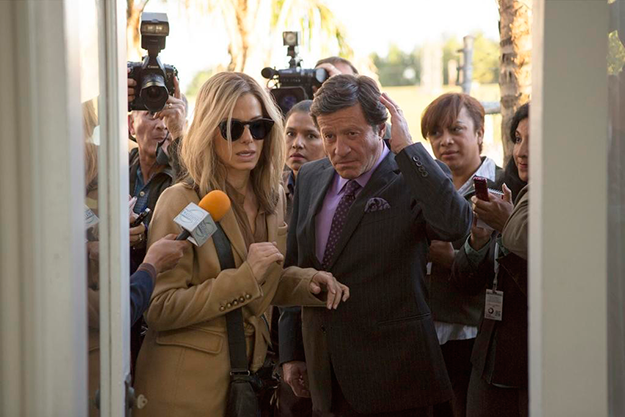
The result is less a comic broadside targeting globalization and media politics than a political Punch and Judy show re-imagined for James Carville and Mary Matalin. Thornton has said that Carville’s baldness wasn’t the inspiration for shaving his head to play Candy. But the real-life Castillo—former Bolivian president Gonzalo Sanchez de Lozada, aka Goni—hired the Washington, D.C. firm of Greenberg Carville Shrum to manage his race for a non-consecutive second term. In Boynton’s film, Carville shamelessly uses his fame, clout, and earthy down-home humor to keep Goni happy and to promote the work actually done by other strategists, pollsters, and focus-group experts in his company. In the documentary, there is no race to the finish between two American superstars: only Goni’s campaign hires expensive Yankees. Green’s feature focuses on the fictional Jane-Candy axis rather than on the perilous spectacle of egalitarian Americans supporting an elitist candidate like Castillo.
Though Jane and Candy don’t court and spark like Matalin and Carville, Thornton, with his self-satisfied gleam, and Bullock, with her appealing blend of earnestness and gusto, play off each other wittily. You believe they share the rare emotional intimacy of big-time operators who recognize each other’s wiliness and force. Unfortunately, though, most of the time they act like frat house prank-masters. At the movie’s nadir, Jane prods her campaign bus driver to overtake Candy’s bus on a winding mountain road. She caps this insane race by mooning Candy and his candidate—a crowd-pleasing gesture, to be sure, but one that lacks the heart and invention of memorable lowdown high jinks. Maybe Green was seeking a visual rhyme: Candy’s bare pate matches Jane’s naked ass.
Telling the story mostly from Jane’s often screwy perspective, the filmmakers struggle to generate a wised-up rooting interest and vivid gallows humor comparable to what audiences feel watching newshounds maneuvering for Death Row scoops in His Girl Friday or medical virtuosos outsmarting the bureaucracy in M*A*S*H. To rouse any rueful laughter about professional bravado when the stakes are life or death, the filmmakers must convince us that their characters are super-competent and clicking on all cylinders even when they’re rash or amoral. But Our Brand Is Crisis wastes too much time setting up Jane as a burned-out case who steps back into the fray mainly for a chance to beat her nemesis Candy. The movie stumbles from the get-go, when Jane reacts with dizziness and nausea to the high altitude and thin air of La Paz, prodding Bullock into pratfalls and vomit gags better suited to Miss Congeniality 3 (a movie I hope is never made).
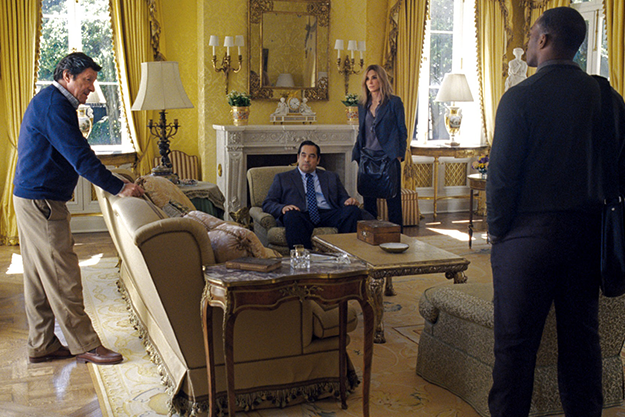
Jane lays her claim to brilliance in one fleeting section. It starts when she witnesses one of Candy’s local operatives cracking an egg on Castillo’s head and Castillo responds by punching the culprit in the face. Jane instructs Castillo to own the moment and refuse to apologize, thus personifying toughness and grit. Castillo’s opponents have touted the fragility of Bolivia’s democracy and economy so they can call for change and fresh direction. Jane urges Castillo to peddle the message that Bolivia faces unprecedented crises and requires battle-hardened leadership. Pressing the political reset button is a shrewd move, but is it really a stroke of inspiration? Jane herself compares her new motto, “our brand is crisis,” to textbook fear tactics. She invokes the “Daisy” commercial that made American voters regard Barry Goldwater as a man with an itchy nuclear trigger-finger.
The rest of her campaign rests on cheap shots, dirty tricks, and cunning. Castillo learns to turn toward the TV camera when he tears up in an interview. Jane uses a photo of Candy’s candidate standing near Klaus Barbie to suggest that he’s a Nazi, and she tells a train conductor to pull the man away from the start of his own whistle-stop tour.
Apart from Bullock and Thornton, the talented American actors don’t get a chance to strut their stuff and they rarely mesh as a team. Jane mostly calls on them for isolated favors and shows of support. Anthony Mackie’s glimmer of soulfulness is wasted on the slapdash role of a campaign organizer who flirted with being a Buddhist monk; Ann Dowd’s electric knowingness goes for naught as an old pro with connections to the State Department. And Scoot McNairy’s straight-faced goofiness fails to ignite the throwaway part of a TV-ad director who has terrible ideas, like depicting Castillo as a savior catching peasants who fall through the clouds. Zoe Kazan is amusing as Jane’s private-eye/opposition researcher, but she’s basically playing a one-joke character: a young woman so devoted to being elusive that she goes by the name “LeBlanc.”
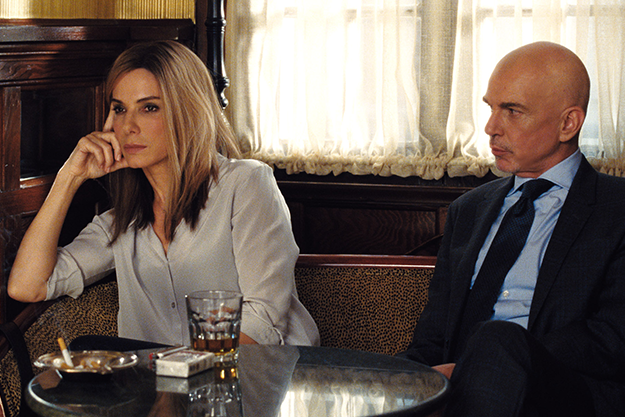
The seams in this ensemble are surprising—after all, just four months ago, with Manglehorn, Green proved he was an ace actors’ director. Then again, Green has become one of American film’s great (or near-great) unpredictables. Almost alarmingly productive, he also produces independent movies (like Great World of Sound) and at least once has written a script for another director’s film (Andrew Neel’s forthcoming Goat). As a director, Green has shifted between poetic, sometimes witty character studies (George Washington, Prince Avalanche) and brash commercial comedies (Pineapple Express; HBO’s Eastbound & Down). He’s an adventurous moviemaker—in Our Brand Is Crisis he even brings a unique visual sense of dislocation to routine drunk scenes. But in search of rough-edged spontaneity, he sometimes lets movies get away from him.
At the turning point of Our Brand Is Crisis, Jane says that instead of forcing their man to fit the campaign’s narrative, she and her team should change the narrative to fit the man. Green too often does the former in Our Brand Is Crisis, especially with the character of Eddie (Reynaldo Pacheco), a young campaign worker from a La Paz slum who serves as an awkward symbolic stand-in for all of Bolivia’s disaffected youth. Eddie volunteers to work for Castillo because his father revered the politician, who did create and expand social services and enfranchise indigenous people in his first term as president. Pacheco and de Almeida share one subtle, piercing scene: Castillo tells Eddie that a president can be a father to his citizens and, like a parent, be strict with them. Eddie is so moved by the invocation of fatherhood that you’re not sure whether he registers Castillo’s ominous paternalism.
Of course, the documentary doesn’t need to invent spokesmen for Bolivian aspiration, because Goni’s main antagonists are not political functionaries but his actual political threats: the center-right populist Manfred Reyes Villa, and the indigenous workers’ champion Evo Morales, who did become president four years later. In the Boynton film’s most devastating irony, the liberals at Greenberg Carville Shrum believe that focus groups empower poor Bolivians by forcing candidates to respond to their needs. But Goni and his advisors don’t venture from their techno-bubble long enough to gauge the fierceness or depth of the voters’ discontent.
Green and Straughan treat the Americans’ myopia as the stuff of political soap opera. They portray Calamity Jane as a woman who ultimately sees through the emptiness of her manipulation politics and abruptly changes her career. It’s the dramatic equivalent of a Hail Mary pass, and not even Bullock can make the catch.



